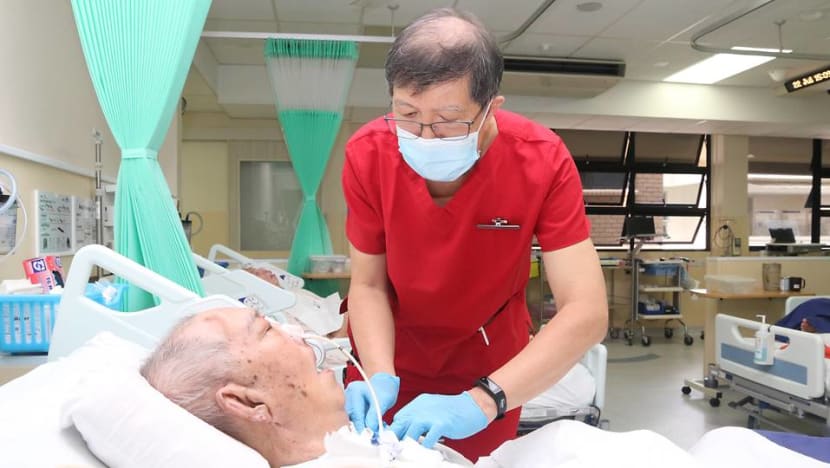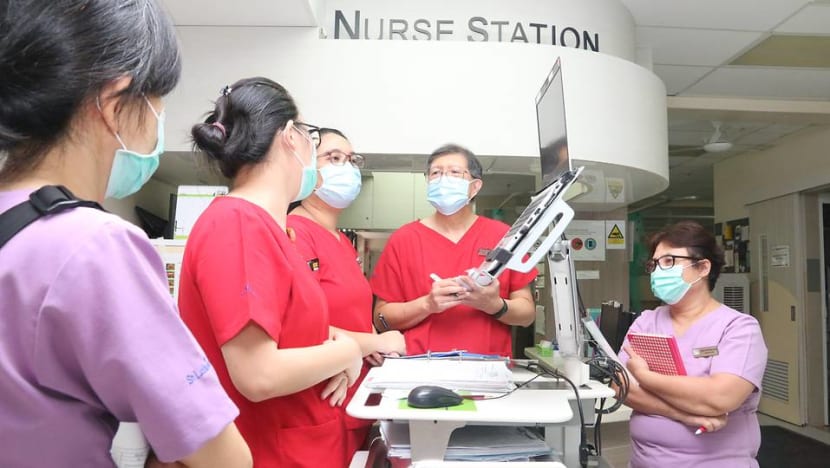From oil and gas to nursing: A 63-year-old’s journey to a job that's 'more meaningful'
Ahead of Nurses' Day on Aug 1, CNA spoke to a man who says that joining the profession late in his career after being retrenched has been hugely rewarding.

Mr Clement Ng, who was in the oil and gas industry from more than 30 years, is now a staff nurse at St Luke's Hospital. (Photo: St Luke's Hospital)
SINGAPORE: Mr Clement Ng could do his job as a senior engineer in the oil and gas industry with his eyes closed. He'd been in the industry for more than 30 years after all.
But in 2016, at the age of 59, faced with retrenchment, he took a giant leap of faith and switched from understanding systems to caring for people.
At the time, he was just a year shy of his intended retirement, but suddenly left without a job, he knew he was not done working. He also wanted to do something “more meaningful” than sitting at home.
“Physically, I'm still very active, healthy, so if I relax and do nothing I find that it's not the kind of way of life I want,” he said. The way of life he did want turned out to be very different - Mr Ng became a nurse. Now aged 63, he is working at St Luke’s Hospital, a community hospital.
THE DECISION TO JOIN HEALTHCARE
Speaking to CNA in a virtual interview ahead of Nurses’ Day on Aug 1, Mr Ng said that after his retrenchment, he started attending job fairs and career talks, and was attracted by the healthcare industry.
He realised that the need for caregivers would increase with Singapore's ageing population. He also wanted to, in a way, make up for the time he felt he had no choice but to put his mother in a nursing home.
“One of my life regrets is that I was unable to take care of my mum during one of my busier times in my career. I had to place my mum in a nursing home. So I told myself, if I have the opportunity, I think I want to do something hands-on, and take care of the elderly if I can,” he said. His mother died in 2003.
Mr Ng took up the Healthcare Support (Nursing Care) course offered by HMI Institute of Health Sciences. His children, a daughter aged 30, and sons in their 20s, were concerned about whether his age would get in the way of what he wanted to do.
“I assured them, I showed it to them that I was jogging everyday, I'm physically so fit, I have no issues at all,” he said.
While he was sure he could do it physically, when he was training he was confronted with a challenge he was not expecting - changing diapers.
“You not only learn just how to shower patients, you need to know how to change their diapers, to clean them up. During the course, the emphasis was to treat the patient as your own family,” he said.
“People might think that this is a dirty job but I think so many people in healthcare are doing it. For what? They are caring for people.”
“I find that there is a fulfillment in the sense that you are doing something nice and neat, clean up the patient and you find that there is satisfaction. In a way, it's a sacrifice, but I find it worth it.”

While Mr Ng was happy to be of such assistance, seeing the nurses at work inspired him to do more.
WANTING TO DO MORE
“I realised there are a lot of things beyond that (being a healthcare assistant). For example, you have to make sure you serve the patient medication correctly, make sure you know how to respond to patients if suddenly there’s a change in status, suddenly pressure goes high, the patient suddenly falls down,” he said.
About three months into the job, he was already keen to do more.
He applied for a two-year Diploma in Nursing through the Professional Conversion Programme and started what would turn out to be a challenging time of "foreign" words and studying for long hours.
"I was a science student, so I should be able to study now, but I did not realise ... because I have not studied for so long ... memory itself is a challenge. So many things are new, the human body - the different parts and functions - and nursing is totally a different setting from what I learnt in science,” he said.
His classmates, many of them in their 20s and 30s, were always there to encourage him and share notes with him, he said.
“They were quite surprised to see that at this age, I still want to study. When I told them that I had difficulties, they were very encouraging,” he said.
“I always stayed back and studied, and when they saw me, they would come and see if I have any problems and share their notes with me because I may not be able to write so fast.”
While he managed well enough, just before beginning his final clinical attachment at St Luke's Hospital, Mr Ng found himself inundated with fears, and afraid he would disappoint the people who had helped and supported him.
“I was somehow very nervous … I was thinking, am I going to be unable to pass through this attachment? Am I going to waste my two year effort?”
With the encouragement from his mentor from Nanyang Polytechnic, he pressed on, and graduated with a diploma in March this year. He was hired as staff nurse at St Luke’s Hospital in June.
THE SATISFACTION OF BEING A COMMUNITY NURSE
At St Luke's, Mr Ng provides more advanced care to patients, like wound dressing, administering medication and tailoring care plans for bed-ridden patients at the Continued Care ward to ensure that their needs are met.
In his previous job, Mr Ng had little time to interact with patients. The focus then was on treating patients' conditions, he said.
Being in a community hospital setting, where his patients are in a "more stable" condition, allows him to interact with patients on a more personal basis, he said.
“I'm able to talk to them and understand their situation, and interact with them, encourage them, because (a) community hospital, it's to prepare patients to (go) back to the community, so we need to do some education to remind them when they get discharged, what they should do, take care of themselves,” he said.
He also gets to interact with their family members.
"When their family members come and visit, family members see that the patient is different, you know. They say 'today my dad is so shining, so refreshed',” he said. They also notice that their loved ones are happier, he said.
“In a way we feel that what effort we put in, people appreciate it, people can feel it. It motivates us to work more diligently, we want to provide the best care for people,” he said.
It is a joy that he brings home and shares with his family. There was also an unexpected bonus from attending his diploma course - learning how to relate to younger people by interacting with his classmates.
“Through them, I learnt how to talk to my children,” he said.
“I (had) never tried to listen to their views, so I (realised) I also needed to encourage them to tell me what problems they have. Because I realised my younger colleagues, my younger classmates, they allow me to tell them my problems, so I think I also need to allow my children to tell me their problems."
Despite the rewards he has reaped from his new career, Mr Ng’s job switch has not been without naysayers.
“Some of my peers, when they heard I am joining healthcare, they are thinking a bit negatively ... But I hope I can encourage them. The message I want to tell them is: Imagine if you yourself are in that situation, you need someone to clean you,” he said.
He added that older people should learn some basic skills, like how to transfer a patient from a wheelchair to the bed, even if they do not know how to clean someone else.
“We need to think of what will come in another five, 10 years' time. If we are healthy now, and we are able now, I think we should learn something, stand up and learn how to help people," he said.














